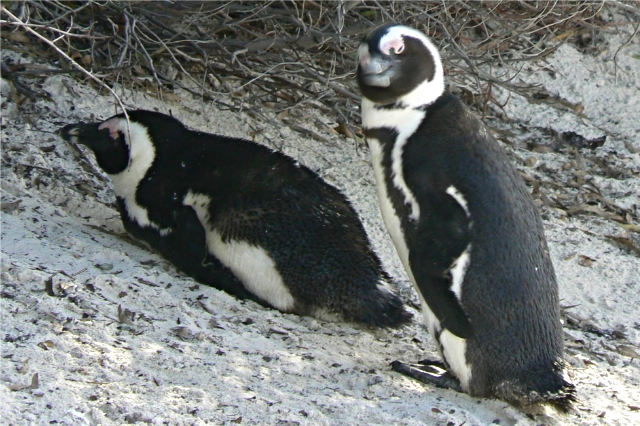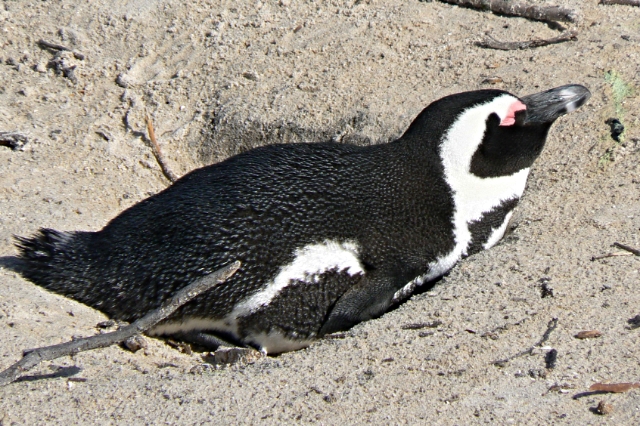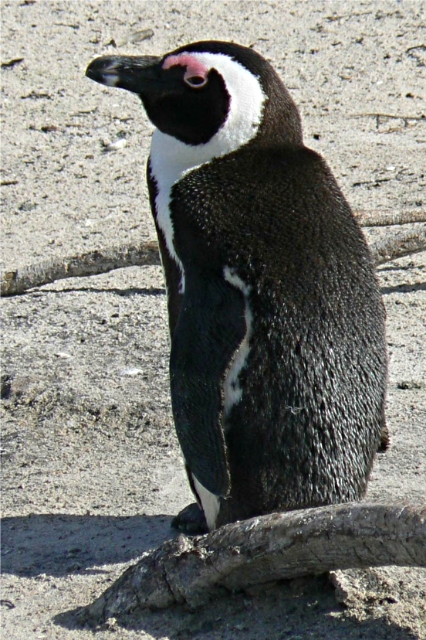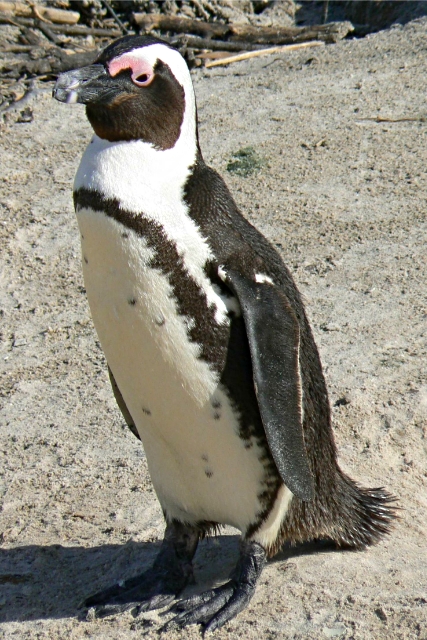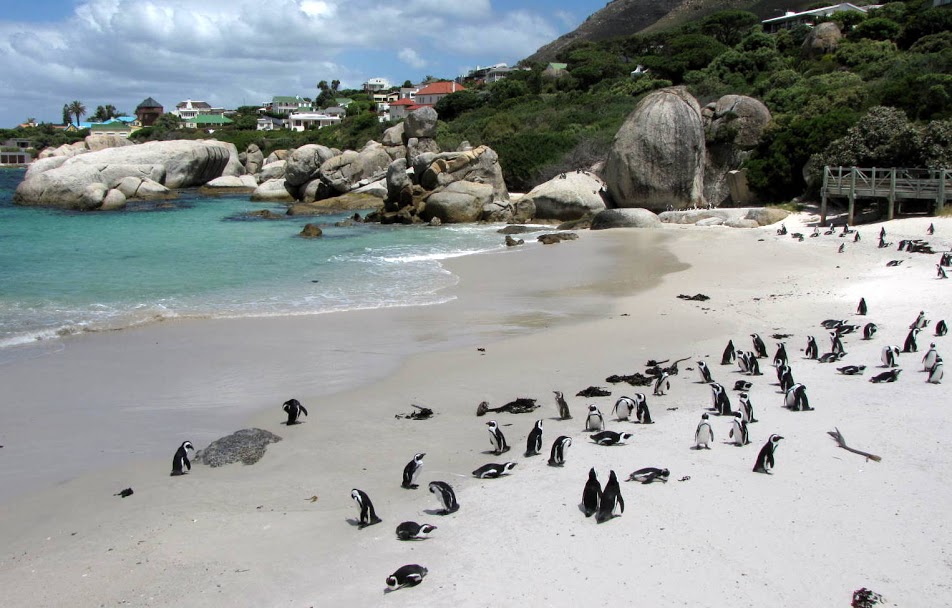
African Penguin
- Lisbeth
- Site Admin
- Posts: 66797
- Joined: Sat May 19, 2012 12:31 pm
- Country: Switzerland
- Location: Lugano
- Contact:
Re: African Penguin - Bird of the Month April 2015
Sunday on the beach 


"Education is the most powerful weapon which you can use to change the world." Nelson Mandela
The desire for equality must never exceed the demands of knowledge
The desire for equality must never exceed the demands of knowledge
- Lisbeth
- Site Admin
- Posts: 66797
- Joined: Sat May 19, 2012 12:31 pm
- Country: Switzerland
- Location: Lugano
- Contact:
Re: African Penguin - Bird of the Month April 2015
Saturday evening on the beach 
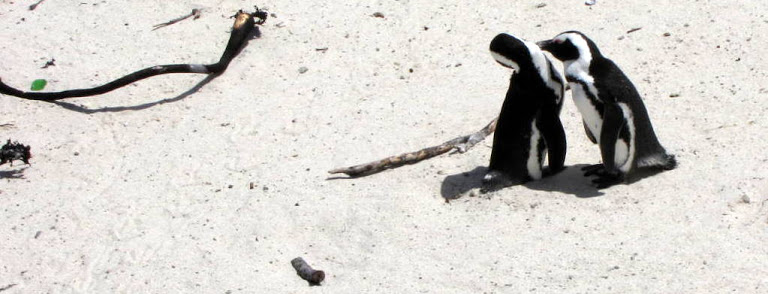

"Education is the most powerful weapon which you can use to change the world." Nelson Mandela
The desire for equality must never exceed the demands of knowledge
The desire for equality must never exceed the demands of knowledge
Re: African Penguin - Bird of the Month April 2015
Almost the end of the month, so keep 'em coming all!  Love all the pics, thanks for everyone's contributions
Love all the pics, thanks for everyone's contributions 

Re: African Penguin - Bird of the Month April 2015
Friends and Foes
Predators of the African penguin at sea include Cape fur seals, sharks and killer whales. On land, predators include mongoose, Cape genet, domestic cats and leopard. Kelp gulls, large herons, rats and African sacred ibises prey on eggs and chicks. African penguins also compete on land with Cape fur seals, gannets, cormorants and other sea birds for breeding space.
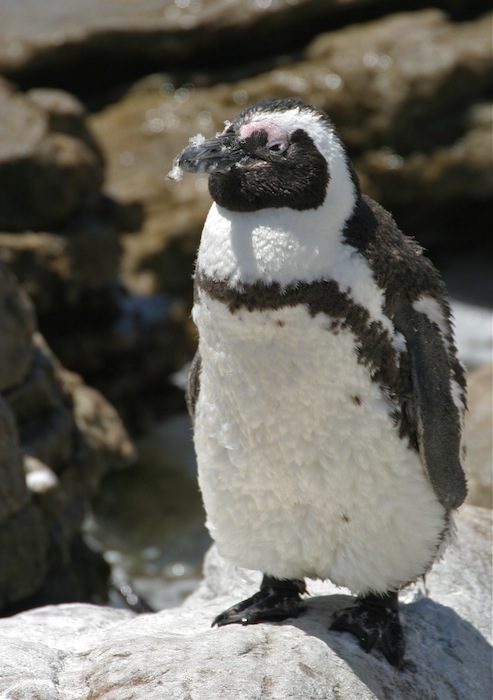
Smart Strategies
Although African penguins are well adapted to survive cold aquatic environments, they are also able survive in warm terrestrial environments through physiological and behavoural adaptations. The African penguins are mostly active at their breeding sites during dusk and dawn. Breeding pairs nest in burrows or some form of shelter that provides protection from the sun. Non-breeding African penguins cope with the heat by spending most of the day at sea, regularly swimming, or loafing on the beach in groups. Penguins that are out in the open during the day usually turn their backs to the sun, so that their feet, flippers and face are shaded.
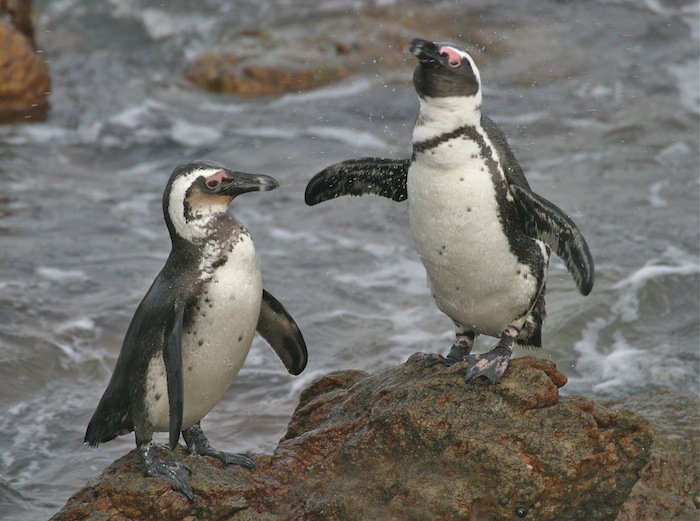
The distinct pink patch of skin found above the bird’s eye helps the bird to cope with changing temperature. As the external temperature around them increases, the bird’s body sends more blood to the glands found at these pink patches of skin, causing the pink patches to change color and turn a darker shade of pink. This in turn causes the glands to be cooled down by the air surrounding it. Another response to overcome heat stress is panting.
The African penguin’s black back and white belly coloration is an important form of camouflage at sea. The white belly deters predation from underwater predators looking upwards and the black back deters detection from predators swimming above the bird whilst looking down onto the dark depths of the water. The birds’ heavy bone structure makes it possible for it to dive to deep depths.
Predators of the African penguin at sea include Cape fur seals, sharks and killer whales. On land, predators include mongoose, Cape genet, domestic cats and leopard. Kelp gulls, large herons, rats and African sacred ibises prey on eggs and chicks. African penguins also compete on land with Cape fur seals, gannets, cormorants and other sea birds for breeding space.

Smart Strategies
Although African penguins are well adapted to survive cold aquatic environments, they are also able survive in warm terrestrial environments through physiological and behavoural adaptations. The African penguins are mostly active at their breeding sites during dusk and dawn. Breeding pairs nest in burrows or some form of shelter that provides protection from the sun. Non-breeding African penguins cope with the heat by spending most of the day at sea, regularly swimming, or loafing on the beach in groups. Penguins that are out in the open during the day usually turn their backs to the sun, so that their feet, flippers and face are shaded.

The distinct pink patch of skin found above the bird’s eye helps the bird to cope with changing temperature. As the external temperature around them increases, the bird’s body sends more blood to the glands found at these pink patches of skin, causing the pink patches to change color and turn a darker shade of pink. This in turn causes the glands to be cooled down by the air surrounding it. Another response to overcome heat stress is panting.
The African penguin’s black back and white belly coloration is an important form of camouflage at sea. The white belly deters predation from underwater predators looking upwards and the black back deters detection from predators swimming above the bird whilst looking down onto the dark depths of the water. The birds’ heavy bone structure makes it possible for it to dive to deep depths.
- nan
- Posts: 26448
- Joined: Thu May 31, 2012 9:41 pm
- Country: Switzerland
- Location: Central Europe
- Contact:
Re: African Penguin - Bird of the Month April 2015
let's go
 2.10.2009
2.10.2009
and back


 2.10.2009
2.10.2009 and back


Kgalagadi lover… for ever
https://safrounet.piwigo.com/
https://safrounet.piwigo.com/
- nan
- Posts: 26448
- Joined: Thu May 31, 2012 9:41 pm
- Country: Switzerland
- Location: Central Europe
- Contact:
Re: African Penguin - Bird of the Month April 2015
it was 







Kgalagadi lover… for ever
https://safrounet.piwigo.com/
https://safrounet.piwigo.com/
Re: African Penguin - Bird of the Month April 2015
Poorer world without me
African penguins and other sea birds that feed on fish can be used as indicators of location and variability of marine resources and ecosystem changes.
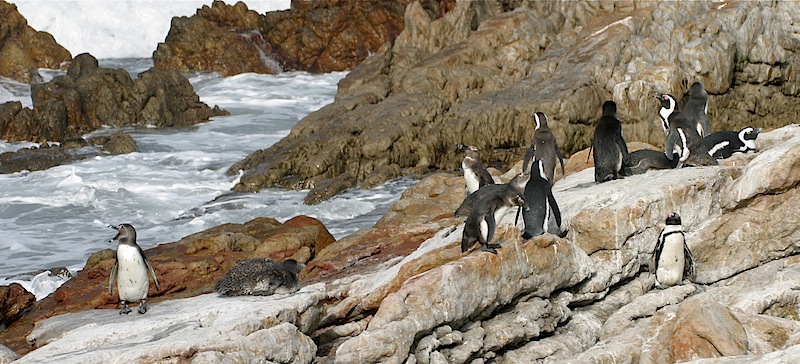
People
Historically, African penguins were exploited for food, fuel to supply ship boilers, and were rendered down for fat. Their eggs were also collected and used as a source of food. The rapid population decline of the African penguin between the 1920s and mid-1950s is largely attributed to overexploitation of eggs, where 48% of all eggs produced were collected for human consumption. Further population declines were caused by habitat modification of penguin nesting sites through the extraction of guano that is a preferred substrate for constructing nesting borrows. The lack of guano deposits led to poor recruitment because penguins were forced to breed on unideal surfaces such open ground, were they were exposed to extreme weather elements and the eggs and young chicks suffered increased predation from predators.
The two practices of egg collection and guano extraction have since ceased but other eminent threats have emerged and these include oil spillages and competition with commercial fishing for food resources. Because of their restricted distribution range, oil spills can affect large proportions of the population, leading to high mortalities and impaired breeding success. The fishing industry competes with the African penguin for food resources, especially for sardines and anchovies. Reduced abundance of these fish species as a result of over-fishing might lead to further decline of the African penguin populations.
Currently, African penguins are included in ecotourism, education and research activities. Most colonies of African penguins are inaccessible to people, however there are two mainland colonies (Boulders Beach, Simon’s Town and Stoney Point, Betty’s Bay) along the coast of the Western Cape, South Africa, which provide opportunities for the public to observe the African penguins in their natural habitat.
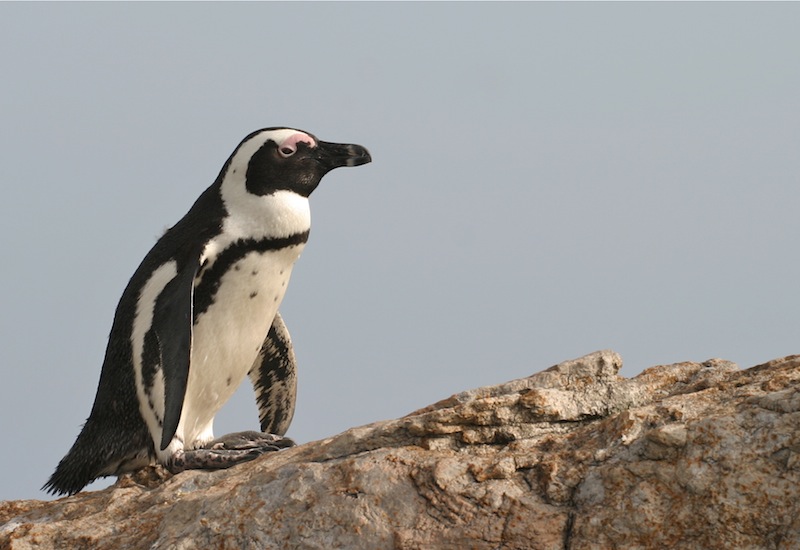
African penguins and other sea birds that feed on fish can be used as indicators of location and variability of marine resources and ecosystem changes.

People
Historically, African penguins were exploited for food, fuel to supply ship boilers, and were rendered down for fat. Their eggs were also collected and used as a source of food. The rapid population decline of the African penguin between the 1920s and mid-1950s is largely attributed to overexploitation of eggs, where 48% of all eggs produced were collected for human consumption. Further population declines were caused by habitat modification of penguin nesting sites through the extraction of guano that is a preferred substrate for constructing nesting borrows. The lack of guano deposits led to poor recruitment because penguins were forced to breed on unideal surfaces such open ground, were they were exposed to extreme weather elements and the eggs and young chicks suffered increased predation from predators.
The two practices of egg collection and guano extraction have since ceased but other eminent threats have emerged and these include oil spillages and competition with commercial fishing for food resources. Because of their restricted distribution range, oil spills can affect large proportions of the population, leading to high mortalities and impaired breeding success. The fishing industry competes with the African penguin for food resources, especially for sardines and anchovies. Reduced abundance of these fish species as a result of over-fishing might lead to further decline of the African penguin populations.
Currently, African penguins are included in ecotourism, education and research activities. Most colonies of African penguins are inaccessible to people, however there are two mainland colonies (Boulders Beach, Simon’s Town and Stoney Point, Betty’s Bay) along the coast of the Western Cape, South Africa, which provide opportunities for the public to observe the African penguins in their natural habitat.

Re: African Penguin - Bird of the Month April 2015
Conservation status and what the future holds
The African penguins are undergoing very rapid population declines. The initial records of African penguin populations along the Namibia and South African coastline estimated around one million breeding pairs in the 1920s but these populations have rapidly declined to less than 30 000 pairs. For example, it is estimated that breeding population in South Africa has experienced a 95% decline in six years from 69 000 pairs in 2001 to 20 000 pairs in 2011. As a result it is projected that the African penguin may become extinct within the next 15 years.
It is roughly estimated that about 169 African penguins are found captive in South Africa. These penguins are found at Bayworld, the National Zoological Gardens in Pretoria, Bester Birds, East London Aquarium, Hartebeespoort Aquarium, SANCCOB, Sea World Durban (housing the largest number of birds), Tenikwa Wildlife Awareness Centre, Two Oceans Aquarium and World of Birds.
In May 2005, the IUCN (International Union for Conservation of Nature) classified African penguins as Endangered. Currently the species is listed under Appendix II of the CITES (Convention on International Trade of Endangered Species) and is therefore regulated according to this convention’s guidelines. In South Africa, the movement of African penguins from one captive population to another is regulated by a permitting system, which works alongside relevant national or provincial laws.
Several management actions that have been implemented to conserve the African penguins include formal protection of breeding colonies by converting areas with known breeding sites into nature reserves and national parks, prohibiting the collection of guano and eggs, establishing marine protected areas where fishing is prohibited, ongoing research to monitor population trends in relation to prey availability and disease outbreaks, active management of population sizes of predators, artificial care of abandoned chicks, providing artificial nests and rehabilitating sick birds. Some of the leading organizations in the conservation of the African penguin include the South African Foundation for the Conservation of Coastal Birds (SANCCOB), Dyer Island Conservation Trust and South African Marine Rehabilitation and Education Centre (SAMREC).
Relatives
The African penguin is one of four species of banded penguins that belong to the genus Spheniscus. The other three banded penguins are the Humboldt penguin (Spheniscus humboldti), the Magellanic penguin (S. magellanicus), which occur along coastal areas of Chile, Peru and Argentina, and the Galapagos penguin (S. mendiculus), which is found on the Galapagos Islands.
http://www.sanbi.org/creature/african-penguin
The African penguins are undergoing very rapid population declines. The initial records of African penguin populations along the Namibia and South African coastline estimated around one million breeding pairs in the 1920s but these populations have rapidly declined to less than 30 000 pairs. For example, it is estimated that breeding population in South Africa has experienced a 95% decline in six years from 69 000 pairs in 2001 to 20 000 pairs in 2011. As a result it is projected that the African penguin may become extinct within the next 15 years.
It is roughly estimated that about 169 African penguins are found captive in South Africa. These penguins are found at Bayworld, the National Zoological Gardens in Pretoria, Bester Birds, East London Aquarium, Hartebeespoort Aquarium, SANCCOB, Sea World Durban (housing the largest number of birds), Tenikwa Wildlife Awareness Centre, Two Oceans Aquarium and World of Birds.
In May 2005, the IUCN (International Union for Conservation of Nature) classified African penguins as Endangered. Currently the species is listed under Appendix II of the CITES (Convention on International Trade of Endangered Species) and is therefore regulated according to this convention’s guidelines. In South Africa, the movement of African penguins from one captive population to another is regulated by a permitting system, which works alongside relevant national or provincial laws.
Several management actions that have been implemented to conserve the African penguins include formal protection of breeding colonies by converting areas with known breeding sites into nature reserves and national parks, prohibiting the collection of guano and eggs, establishing marine protected areas where fishing is prohibited, ongoing research to monitor population trends in relation to prey availability and disease outbreaks, active management of population sizes of predators, artificial care of abandoned chicks, providing artificial nests and rehabilitating sick birds. Some of the leading organizations in the conservation of the African penguin include the South African Foundation for the Conservation of Coastal Birds (SANCCOB), Dyer Island Conservation Trust and South African Marine Rehabilitation and Education Centre (SAMREC).
Relatives
The African penguin is one of four species of banded penguins that belong to the genus Spheniscus. The other three banded penguins are the Humboldt penguin (Spheniscus humboldti), the Magellanic penguin (S. magellanicus), which occur along coastal areas of Chile, Peru and Argentina, and the Galapagos penguin (S. mendiculus), which is found on the Galapagos Islands.
http://www.sanbi.org/creature/african-penguin



